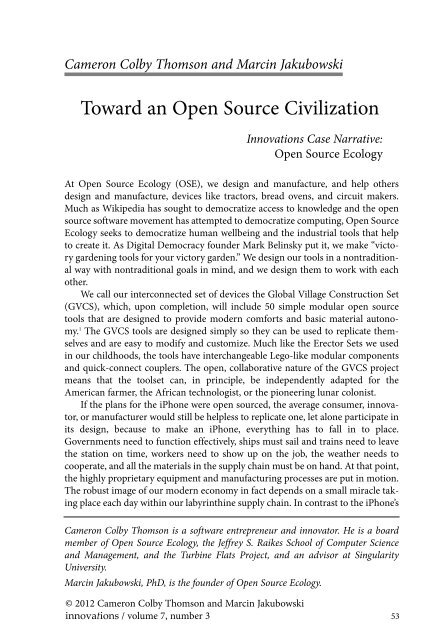Jakubowski-thomson
Jakubowski-thomson
Jakubowski-thomson
You also want an ePaper? Increase the reach of your titles
YUMPU automatically turns print PDFs into web optimized ePapers that Google loves.
Cameron Colby Thomson and Marcin <strong>Jakubowski</strong><br />
Toward an Open Source Civilization<br />
Innovations Case Narrative:<br />
Open Source Ecology<br />
At Open Source Ecology (OSE), we design and manufacture, and help others<br />
design and manufacture, devices like tractors, bread ovens, and circuit makers.<br />
Much as Wikipedia has sought to democratize access to knowledge and the open<br />
source software movement has attempted to democratize computing, Open Source<br />
Ecology seeks to democratize human wellbeing and the industrial tools that help<br />
to create it. As Digital Democracy founder Mark Belinsky put it, we make “victory<br />
gardening tools for your victory garden.” We design our tools in a nontraditional<br />
way with nontraditional goals in mind, and we design them to work with each<br />
other.<br />
We call our interconnected set of devices the Global Village Construction Set<br />
(GVCS), which, upon completion, will include 50 simple modular open source<br />
tools that are designed to provide modern comforts and basic material autonomy.<br />
1 The GVCS tools are designed simply so they can be used to replicate themselves<br />
and are easy to modify and customize. Much like the Erector Sets we used<br />
in our childhoods, the tools have interchangeable Lego-like modular components<br />
and quick-connect couplers. The open, collaborative nature of the GVCS project<br />
means that the toolset can, in principle, be independently adapted for the<br />
American farmer, the African technologist, or the pioneering lunar colonist.<br />
If the plans for the iPhone were open sourced, the average consumer, innovator,<br />
or manufacturer would still be helpless to replicate one, let alone participate in<br />
its design, because to make an iPhone, everything has to fall in to place.<br />
Governments need to function effectively, ships must sail and trains need to leave<br />
the station on time, workers need to show up on the job, the weather needs to<br />
cooperate, and all the materials in the supply chain must be on hand. At that point,<br />
the highly proprietary equipment and manufacturing processes are put in motion.<br />
The robust image of our modern economy in fact depends on a small miracle taking<br />
place each day within our labyrinthine supply chain. In contrast to the iPhone’s<br />
Cameron Colby Thomson is a software entrepreneur and innovator. He is a board<br />
member of Open Source Ecology, the Jeffrey S. Raikes School of Computer Science<br />
and Management, and the Turbine Flats Project, and an advisor at Singularity<br />
University.<br />
Marcin <strong>Jakubowski</strong>, PhD, is the founder of Open Source Ecology.<br />
© 2012 Cameron Colby Thomson and Marcin <strong>Jakubowski</strong><br />
innovations / volume 7, number 3 53


